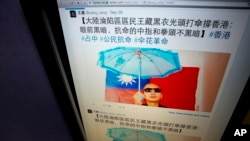While demonstrators in Hong Kong have been allowed to protest freely, in mainland China authorities have arrested dozens of people for expressing support for the Hong Kong pro-democracy movement.
Among those arrested is prominent scholar and activist, Guo Yushan. Family members say officials took Guo from his home early Thursday. Guo’s arrest is only the latest in a series of detentions this month, while pro-democracy protests fill the streets of Hong Kong.
Maya Wang is a researcher with Human Rights Watch. “Whatever the immediate reasons are, I think their detentions are an utter red flag for China’s human rights,” said Wang.
More than 50 people on the mainland have reportedly been arrested or gone missing during the past two weeks. Many were charged with the same crime as Guo: “picking quarrels and provoking troubles.” Many of those had expressed support for Hong Kong’s demands for direct elections.
Last week, authorities arrested 10 people who attempted to attend a Beijing poetry reading in support of the democracy protests. When asked about the recent detentions, China Foreign Ministry spokesperson Hong Lei said he was not aware of the arrests.
Hong Lei said he was not aware of the reports and stressed that China was a country under the rule of law. He said that for those who were offending the law, China would take actions against them to protect public order and social interest.
Guo Yushan had been an associate of rights advocate Xu Zhiyong, who was tried and sentenced earlier this year. Two years ago Guo helped blind lawyer and activist Chen Guangcheng escape to the United States. Guo’s most prominent work may have been as head of the Transition Institute, which focused on environmental problems, reform of Beijing’s hukou system that limits free movement in China, and studies on China’s taxi industry.
Guo had not come out in public support of the Hong Kong protests, but Maya Wang said his arrest was part of a pervasive crackdown under China’s President Xi Jinping.
“I think from previous experience some will be released after days or weeks. Some will be held for a longer time and face trial,” said Wang.
Information about Hong Kong’s protests on the mainland remains heavily censored. During the weekend, protest organizers said they sent a letter to President Xi Jinping asking for universal suffrage.




